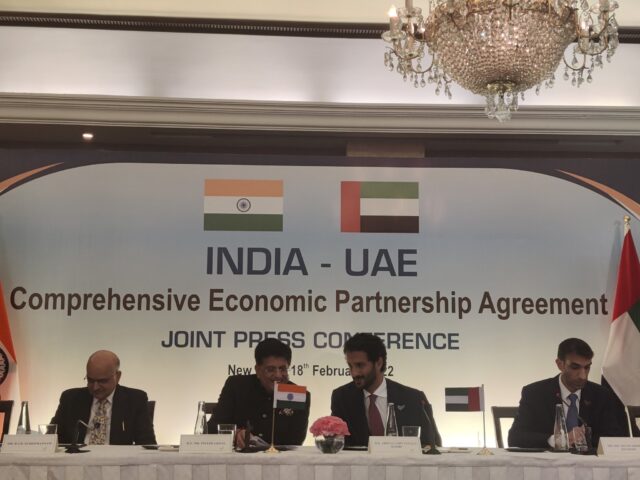India and the UAE finally signed a Free Trade Agreement (FTA) on 18 February. The agreement proposes to reduce the tariff for 80 percent of goods exchanged by the two countries. It will also give zero-duty access to 90 percent of Indian goods entering the UAE.
The FTA is expected to come into effect in about 60 days from now. The agreement aims to push bilateral trade close to $100 billion in the coming five years. Currently, the value of trade between the two countries is $60 billion.
The FTA was signed between Indian Commerce and Industry Minister Piyush Goyal and the UAE’s Minister of Economy Abdulla bin Touq Al Marri. It was the result of 88 days of negotiations.
According to the Indian minister, “This comprehensive economic partnership agreement covers a wide array of gains for both economies, provides opportunities for business in both economies.” The minister also said that labor-intensive exports will be boosted through the Comprehensive Economic Partnership Agreement. The agreement is likely to help labour-intensive industries such as gems and jewelry, textiles, leather, footwear, sports goods, engineering goods, and pharmaceuticals. Currently, goods from India have to pay a 5 percent import duty when entering the UAE.
The agreement covers areas including goods, services, rules of origin, customs procedures, government procurement, intellectual property rights, and e-commerce.
Welcoming the CEPA agreement, Al Marri said, “I’m confident that the UAE India Comprehensive Economic Partnership Agreement will be regarded as a towering achievement, a new era not only for our two nations but for global trade.”
There is a probability of further tariff concession, according to a commerce ministry official.
India’s Union Commerce minister said there are robust arrangements to protect rules of origin for both economies. The terms will also prevent third countries from exploiting any loophole. The agreement covers permanent safeguard mechanisms to protect business interests against dumping.
The UAE has also agreed under this agreement to allow market access and regulatory approval for pharmaceutical products within 90 days after these products have been approved by countries such as the US, Canada, EU, and Australia.
The growing closeness between India and the UAE, according to the Indian minister will also aid Indian business interests to access markets in other Gulf countries, the larger African and European region.
Different export groupings in India have welcomed this agreement.









